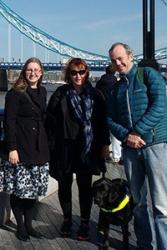Translating public health economics research into policy and practice
 : Transforming Young Lives report authors (centre) Professor Rhiannon Tudor Edwards and guide dog Jazz, (left) Lucy Bryning and (right) Huw Lloyd Williams of �鶹��ý�����
: Transforming Young Lives report authors (centre) Professor Rhiannon Tudor Edwards and guide dog Jazz, (left) Lucy Bryning and (right) Huw Lloyd Williams of �鶹��ý�����
A public health economics expert has highlighted research suggesting that investing in early years has the potential to save millions of pounds across public sectors in Wales, to the National Assembly for Wales ’Children, Young People and Education Committee consultation on the ‘First 1,000 Days’ .
Professor Rhiannon Tudor Edwards, co-director of the (CHEME) at �鶹��ý�����, and her colleague Lucy Bryning, an early career research officer at CHEME, have responded to the call for written evidence to the ‘First 1,000 Days’ consultation, highlighting their recent report “”. The report, which was supported by funding from Public Health Wales, was launched in October 2016 at the Health and Care Research Wales (Research with Impact) Conference in Cardiff and featured on BBC Cymru.
Following a review of the available economic evidence, this report summarises that shifting the curve towards prevention and investing early in the life course has the potential to save millions of pounds across public sectors in Wales. Based on international evidence, they argue that investment that focuses on the critical window of the first few years of life, beginning with pre-conception and early pregnancy, is likely to provide the most efficient use of public resources, yielding returns over and above other forms of financial investment across the economy and investment at other points of the life course.
The University’s Centre for Health Economics and Medicines Evaluation (CHEME) has been working to facilitate the effective translation of economic research into health and social care policy and practice. In November 2016, Rhiannon was invited to the Senedd to act as expert advisor to the National Assembly for Wales, Health, Social Care and Sport Committee as part of their scrutiny of the Welsh Government's draft budget for all health and social care spending 2017-2018. The committee aims to ‘hold the Welsh Government to account by scrutinising expenditure, administration and policy matters, encompassing (but not restricted to): the physical, mental and public health and well-being of the people of Wales, including the social care system’. Rhiannon encouraged the committee to welcome a move towards community led health and social care with an emphasis on prevention, on economic grounds.
CHEME, which is now part of the Bangor Institute for Health and Medical Research (BIHMR), School of Healthcare Sciences within CoHaBS, aims to promote and sustain high-quality health economics research with impact. For more information about CHEME research and publications visit
Follow CHEME on Twitter
Publication date: 6 February 2017
